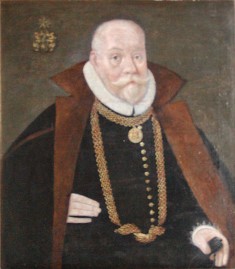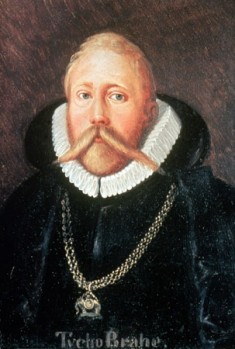| Tycho Brahe | |
|---|---|
 |
|
| Nobleman | |
| Specialty | Astronomy |
| Born | Dec. 14, 1546 Knutstorp Castle, Scania, Denmark, Denmark–Norway |
| Died | Oct, 24, 1601 (at age 54) Prague, Holy Roman Empire |
| Nationality | Danish |
Tycho Brahe was a Danish astronomer, usually known by his first name. His time just pre-dated Galileo’s development of the astronomy, making Tycho the last significant figure in the field to rely on naked-eye observations. He was particularly active in making observations of the planets, which remained among the most detailed and accurate available for many decades. These led him to develop a model of the solar system which was a compromise between the Ptolemaic and Copernican theories. As well as astronomy, Tycho was interested in alchemy.
Brahe’s Early Years
Tycho was born on December 14, 1546, in Knudstrup. He was adopted by an uncle at an early age, and when he was 13, he was sent to Copenhagen to study rhetoric and philosophy. In 1560, his attention was caught by an eclipse of the sun, especially the fact that it occurred precisely when predicted.
Tycho came to regard astronomy as a “divine” science as a result and soon acquired the works of Ptolemy and Johann Stadius in order to learn more about the planets. Nevertheless, at this stage of his life he remained on course for a legal career, enrolling at the University of Leipzig in 1562.
Post-Educational Years
Tycho continued to undertake astronomical studies in his spare time, using simple instruments to make his observations. He left the university in May 1565, but when his uncle died a few weeks, later he traveled to Rostock. Here, he fought a duel with another man over who was the better mathematician, and part of his nose was sliced away. He is said to have made a copper or brass artificial nose to wear. He studied chemistry at Augsburg in the early 1570s before returning to Denmark.
Travels through Europe
Another of Tycho’s uncles allowed him to set up a laboratory in his nearby castle, and in November of 1572 he noticed a “new star” during his observations. His published account of the new body and its measurements, De Nova Stella, gave its name to the term “nova” that is still used today.
After controversially marrying a commoner in 1573, Tycho gave lectures by command of the Danish court, then traveled through Germany and Italy. The Danish king granted him a private island, a pension, and an estate from which to draw income, allowing him to start work on a superb observatory at Uraniborg in 1576.

Published Works
A comet which appeared in 1577 gave Tycho the opportunity to show, by means of parallax measurement, that such bodies did not emanate from the Earth as was the accepted theory of the time, but in fact came from interplanetary space. His calculations and conclusions were published at his own expense in 1588.
This work also set out the Tychonic model of the solar system: in this, the Earth itself was at the center, but the other five known planets revolved around the Sun. Meanwhile, this heliocentric sub-system itself revolved around the Earth, with the “sphere of the fixed stars” even farther beyond.
Later Works and Personal Life
While at Wandsbeck in 1598, Tycho published an autobiography in which he set out his discoveries and described the instruments he used for his observations. From this it is clear that he made great strides in the scientific observation of the planets, correcting many errors which had previously gone unnoticed and taking account of inaccuracies in the instruments of the day.
He also took account of refraction, publishing a table to allow this also to be accounted for. His greatest work, detailing the motions of the Sun, the Moon, and giving precise locations for more than 700 stars, was eventually published just after Tycho’s death and was edited by Johannes Kepler.
Tycho spent over 20 years making systematic observations, the best of their type since the days of Ancient Greece. His fame was such that King James VI of Scotland paid him a visit in 1590; by that time, however, the Danish king had died and his successor had become increasingly irritated by Tycho’s arrogant personality.
Eventually, the land and pension he had been granted were removed, and the astronomer returned to Rostock, eventually settling in Prague on the invitation of the Holy Roman Emperor, Rudolph II. He was once again granted a pension and in 1600, he was joined by Kepler. The two did little work together, but in 1601, Tycho died, some days after suffering a burst bladder at a royal function.